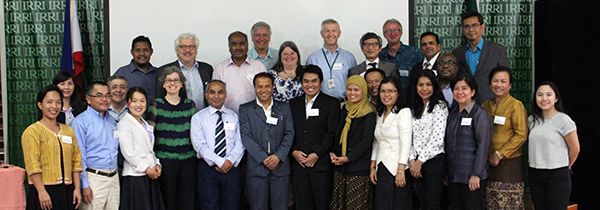LOS BAÑOS, Laguna – Agriculture and environment representatives from nine Asian countries convened this week at the headquarters of the International Rice Research Institute (IRRI) to discuss mutually supportive implementation of international agreements on plant exchange.
National focal points came from Bhutan, Cambodia, Indonesia, Laos, Japan, Malaysia, Nepal, Pakistan, and the Philippines to discuss better complementarity in policies and procedures guiding exchange of plant materials for conservation or research.
"The workshop has been a great forum for the participants to share information on the implementation of the Nagoya Protocol and the International Treaty on Plant Genetic Resources for Food and Agriculture (ITPGRFA) in their countries and to exchange ideas on how these two international instruments can work together to support access to genetic resources, the sharing of benefits arising from their utilization, and the conservation and sustainable use of biodiversity," said Kathryn Garforth, programme officer of the Convention on Biological Diversity (CBD) Secretariat.
”The purpose of this dialogue is to facilitate the harmonious implementation at national level of both instruments and help the national focal points to establish strongest linkages between agriculture and environment to mutually reinforce biodiversity conservation and use,” said Kent Nnadozie, secretary ad interim of the Treaty.
The success of these efforts is of particular importance to IRRI’s work. “IRRI’s mission to reduce poverty and hunger, improve the health of rice farmers and consumers, and ensure environmental sustainability of rice farming relies completely on being able to share rice genetic resources with our partners to develop more robust, resilient, and nutritious varieties of rice,” said Ruaraidh Sackville Hamilton, evolutionary biologist at IRRI and head of the International Rice Genebank.
“The need to share applies not only to the rice conserved in the genebank, but also to the new breeding lines and elite varieties developed by IRRI and its partners,” Sackville Hamilton said further. “It is vital that national legislation facilitates sustainable progress in compliance with the Nagoya Protocol and the International Treaty on Plant Genetic Resources for Food and Agriculture. This meeting represents an important step forward in ensuring that IRRI can continue to work with and support developing countries.”
Sackville Hamilton is presently on-loan to the Treaty at the UN Food and Agriculture Organization and was the main IRRI resource during the workshop.
Conserving the world’s plant genetic resources (seed and non-seed) and using these for sustainable development in agriculture relies heavily on the willingness of countries and organizations to exchange resources. This, in turn, requires assurances that each country will gain a fair and equitable share of the benefits arising from the utilization of the genetic resources it provides to others.
Two agreements seek to provide these assurances—the CBD with its Nagoya Protocol on access and benefit-sharing, and the Treaty. In many countries, the focal points for each agreement are based in different ministries—often environment for the Nagoya Protocol and agriculture for the Treaty.
The workshop this week sought to bring the two sides to the table to discuss national challenges and come to better coordination of procedures.
Workshop participants had the benefit of perspectives from other stakeholders of plant exchange: International Seed Federation, ASEAN Centre for Biodiversity (ACB), Tebtebba (Indigenous People’s Centre for Policy Research and Education), and the Global Forum on Agricultural Research.
The workshop was organized by the Secretariat of the CBD, Bioversity International, the Secretariat of the Treaty, and the ABS Capacity Development Initiative in cooperation with the ASEAN Centre for Biodiversity. The workshop was funded by the Japan Biodiversity Fund with additional financial support from the Secretariat of the Treaty, Bioversity, and GIZ.
For more information, please contact:
Leoniza Morales
Media Relations
International Rice Research Institute
Email: l.morales@irri.org
Telephone: +63 2 580 5600; +63 49 536 2701-05 ext. 2330

